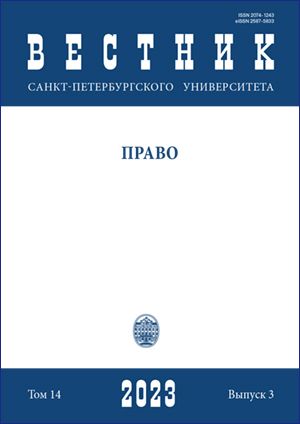Research of the effectiveness of the system of legal regulation of tax relations for operations with cryptocurrency currently in force
DOI:
https://doi.org/10.21638/spbu14.2023.301Аннотация
The article deals with the national practicies of direct and indirect taxation of income from cryptoassets in some countries of the world, including Russia, France, Italy, USA, Great Britain, etc. The authors study various approaches to the concept of cryptocurrency for the purposes of fiscal management: macroeconomic, cost, accounting, legal and institutional approaches. According to the authors position cryptocurrencies for tax reasons should be treated as a property and means of payment. Therefore, any income in cryptocurrencies received by taxpayers should be subject to personal income tax or corporate income tax, respectively. The recognition of cryptocurrencies as a means of payment (that is, private money) leads to the need to exempt taxpayers from paying value added tax in cases where cryptocurrencies perform these monetary functions in transactions performed by taxpayers, in particular, they perform the function of a means of payment. Payment of taxes on income of taxpayers received in cryptocurrencies can be carried out both in cryptocurrencies and in national (fiat) currencies. It is permissible to establish a tax declaration of transactions for cryptocurrency. The foundations of the legal regime of taxation of digital currencies in the Russian Federation have been formed. The problems of introducing effective taxation of cryptocurrency transactions in the Russian Federation are identified, as well as changes to tax legislation are proposed, in particular, clarification of the range of objects that can be classified as “digital currency”, synchronization with the law on digital financial assets, determining the tax base and implementing tax control of transactions with cryptocurrency. As the study showed, the approaches to indirect taxation are the most unified. Tax regulation is a potential incentive to reduce the speculative interest of participants in transactions with cryptocurrencies and increase the transparency of taxation of cryptocurrencies.
Ключевые слова:
cryptocurrency, digital asset, fiscal management, legal regulation, taxation, business accounting
Скачивания
Библиографические ссылки
Загрузки
Опубликован
Как цитировать
Выпуск
Раздел
Лицензия
Статьи журнала «Вестник Санкт-Петербургского университета. Право» находятся в открытом доступе и распространяются в соответствии с условиями Лицензионного Договора с Санкт-Петербургским государственным университетом, который бесплатно предоставляет авторам неограниченное распространение и самостоятельное архивирование.






